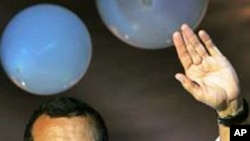The U.S. State Department says Sunday's presidential election in Honduras was a significant, but insufficient step, to end to political crisis that began there in June with the ouster of President Manuel Zelaya. U.S. officials are stopping short of recognizing opposition candidate Porfirio Lobo as the country's next president.
The State Department says the Honduran election met international standards for fairness and transparency and it has commended Porfirio Lobo for what it termed an "ample victory".
But at the same time, it stopped short of formally recognizing Lobo as the country's next president and says Honduras must still take steps toward political reconciliation before it can emerge from the isolation brought by the June 28 ouster of President Zelaya.
The U.S. response to the Honduran vote came Monday from Assistant Secretary of State for Western Hemisphere Affairs Arturo Valenzuela. The Chilean-born U.S. diplomat said the voting was a significant step, yet only a step, in Honduras' return to full democracy after the coup d'etat that drove Mr. Zelaya from office.
He said that given the gravity of the June 28th events - the region's first coup since 1991 and the political polarization of the country - more steps are required.
"For the countries of the Hemisphere and for the United States, to work towards the restoration of Honduras to the Organization of American States [OAS] later on, Honduras must do more than just this election," said Arturo Valenzuela. "It must follow a process of national reconciliation through a government of national unity, and that's what we're urging the Honduran leadership to engage in. The people of Honduras want nothing less."
Valenzuela said the Obama administration seeks implementation of an OAS-backed settlement plan, including the creation of a truth commission on the circumstances of the coup and a congressional vote set for Wednesday on whether Mr. Zelaya will be returned to office to complete his term, which was to end in late-January.
The senior diplomat said the United States wants to see Mr. Zelaya restored to office. But U.S. officials have previously acknowledged that the Honduran National Congress might not support his return. Mr. Zelaya has said he does not want to be voted back into office, arguing that would vindicate a sham election.
Several key Latin American states have said they would not recognize election, arguing, like Mr. Zelaya, that it would legitimize his removal in favor of interim president Roberto Micheletti.
But Assistant Secretary of State Valenzuela stressed that the election process was well underway before the coup.
"The elections provide the Honduran people with a way out. And these elections are not elections that were planned by a de facto government at the last minute in order to whitewash their actions,"he said. "These elections were elections that began several months ago. In fact, the primaries were held in November of last year in each of the major parties."
Valenzuela minimized U.S. differences with regional powers that have rejected the election, saying that they all agree the vote in itself does not resolve the issue. He said Secretary of State Hillary Clinton has been engaged in telephone diplomacy with her counterparts in Brazil, Argentina, Peru, Uruguay and elsewhere to explain the administration approach.
News
US Calls Honduras Election Significant but Insufficient Step to End Political Crisis
update




